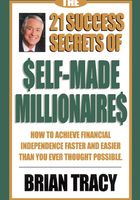One morning, about the beginning of November, while I was inditing some business letters, shortly after breakfast, Eliza Millward came to call upon my sister. Rose had neither the discrimination nor the virulence to regard the little demon as I did, and they still preserved their former intimacy. At the moment of her arrival, however, there was no one in the room but Fergus and myself, my mother and sister being both of them absent, 'on household cares intent'; but I was not going to lay myself out for her amusement, whoever else might so incline: I merely honoured her with a careless salutation and a few words of course, and then went on with my writing, leaving my brother to be more polite if he chose. But she wanted to tease me.
'What a pleasure it is to find you at home, Mr. Markham!' said she, with a disingenuously malicious smile. 'I so seldom see you now, for you never come to the vicarage. Papa, is quite offended, I can tell you,' she added playfully, looking into my face with an impertinent laugh, as she seated herself, half beside and half before my desk, off the corner of the table.
'I have had a good deal to do of late,' said I, without looking up from my letter.
'Have you, indeed! Somebody said you had been strangely neglecting your business these last few months.'
'Somebody said wrong, for, these last two months especially, I have been particularly plodding and diligent.'
'Ah! well, there's nothing like active employment, I suppose, to console the afflicted;-and, excuse me, Mr. Markham, but you look so very far from well, and have been, by all accounts, so moody and thoughtful of late,-I could almost think you have some secret care preying on your spirits. Formerly,' said she timidly, 'I could have ventured to ask you what it was, and what I could do to comfort you: I dare not do it now.'
'You're very kind, Miss Eliza. When I think you can do anything to comfort me, I'll make bold to tell you.'
'Pray do!-I suppose I mayn't guess what it is that troubles you?'
'There's no necessity, for I'll tell you plainly. The thing that troubles me the most at present is a young lady sitting at my elbow, and preventing me from finishing my letter, and, thereafter, repairing to my daily business.'
Before she could reply to this ungallant speech, Rose entered the room; and Miss Eliza rising to greet her, they both seated themselves near the fire, where that idle lad Fergus was standing, leaning his shoulder against the corner of the chimney-piece, with his legs crossed and his hands in his breeches-pockets.
'Now, Rose, I'll tell you a piece of news-I hope you have not heard it before: for good, bad, or indifferent, one always likes to be the first to tell. It's about that sad Mrs. Graham-'
'Hush-sh-sh!' whispered Fergus, in a tone of solemn import. '"We never mention her; her name is never heard."' And glancing up, I caught him with his eye askance on me, and his finger pointed to his forehead; then, winking at the young lady with a doleful shake of the head, be whispered-'A monomania-but don't mention it-all right but that.'
'I should be sorry to injure any one's feelings,' returned she, speaking below her breath. 'Another time, perhaps.'
'Speak out, Miss Eliza!' said I, not deigning to notice the other's buffooneries: 'you needn't fear to say anything in my presence.'
'Well,' answered she, 'perhaps you know already that Mrs. Graham's husband is not really dead, and that she had run away from him?' I started, and felt my face glow; but I bent it over my letter, and went on folding it up as she proceeded. 'But perhaps you did not know that she is now gone back to him again, and that a perfect reconciliation has taken place between them? Only think,' she continued, turning to the confounded Rose, 'what a fool the man must be!'
'And who gave you this piece of intelligence, Miss Eliza?' said I, interrupting my sister's exclamations.
'I had it from a very authentic source.'
'From whom, may I ask?'
'From one of the servants at Woodford.'
'Oh! I was not aware that you were on such intimate terms with Mr. Lawrence's household.'
'It was not from the man himself that I heard it, but he told it in confidence to our maid Sarah, and Sarah told it to me.'
'In confidence, I suppose? And you tell it in confidence to us? But I can tell you that it is but a lame story after all, and scarcely one-half of it true.'
While I spoke I completed the sealing and direction of my letters, with a somewhat unsteady hand, in spite of all my efforts to retain composure, and in spite of my firm conviction that the story was a lame one-that the supposed Mrs. Graham, most certainly, had not voluntarily gone back to her husband, or dreamt of a reconciliation. Most likely she was gone away, and the tale-bearing servant, not knowing what was become of her, had conjectured that such was the case, and our fair visitor had detailed it as a certainty, delighted with such an opportunity of tormenting me. But it was possible-barely possible-that some one might have betrayed her, and she had been taken away by force. Determined to know the worst, I hastily pocketed my two letters, and muttered something about being too late for the post, left the room, rushed into the yard, and vociferously called for my horse. No one being there, I dragged him out of the stable myself, strapped the saddle on to his back and the bridle on to his head, mounted, and speedily galloped away to Woodford. I found its owner pensively strolling in the grounds.
'Is your sister gone?' were my first words as I grasped his hand, instead of the usual inquiry after his health.
'Yes, she's gone,' was his answer, so calmly spoken that my terror was at once removed.
'I suppose I mayn't know where she is?' said I, as I dismounted, and relinquished my horse to the gardener, who, being the only servant within call, had been summoned by his master, from his employment of raking up the dead leaves on the lawn, to take him to the stables.
My companion gravely took my arm, and leading me away to the garden, thus answered my question,-'She is at Grassdale Manor, in-shire.'
'Where?' cried I, with a convulsive start.
'At Grassdale Manor.'
'How was it?' I gasped. 'Who betrayed her?'
'She went of her own accord.'
'Impossible, Lawrence! She could not be so frantic!' exclaimed I, vehemently grasping his arm, as if to force him to unsay those hateful words.
'She did,' persisted he in the same grave, collected manner as before; 'and not without reason,' he continued, gently disengaging himself from my grasp. 'Mr. Huntingdon is ill.'
'And so she went to nurse him?'
'Yes.'
'Fool!' I could not help exclaiming, and Lawrence looked up with a rather reproachful glance. 'Is he dying, then?'
'I think not, Markham.'
'And how many more nurses has he? How many ladies are there besides to take care of him?'
'None; he was alone, or she would not have gone.'
'Oh, confound it! This is intolerable!'
'What is? That he should be alone?'
I attempted no reply, for I was not sure that this circumstance did not partly conduce to my distraction. I therefore continued to pace the walk in silent anguish, with my hand pressed to my forehead; then suddenly pausing and turning to my companion, I impatiently exclaimed, 'Why did she take this infatuated step? What fiend persuaded her to it?'
'Nothing persuaded her but her own sense of duty.'
'Humbug!'
'I was half inclined to say so myself, Markham, at first. I assure you it was not by my advice that she went, for I detest that man as fervently as you can do,-except, indeed, that his reformation would give me much greater pleasure than his death; but all I did was to inform her of the circumstance of his illness (the consequence of a fall from his horse in hunting), and to tell her that that unhappy person, Miss Myers, had left him some time ago.'
'It was ill done! Now, when he finds the convenience of her presence, he will make all manner of lying speeches and false, fair promises for the future, and she will believe him, and then her condition will be ten times worse and ten times more irremediable than before.'
'There does not appear to be much ground for such apprehensions at present,' said he, producing a letter from his pocket. 'From the account I received this morning, I should say-'
It was her writing! By an irresistible impulse I held out my hand, and the words, 'Let me see it,' involuntarily passed my lips. He was evidently reluctant to grant the request, but while he hesitated I snatched it from his hand. Recollecting myself, however, the minute after, I offered to restore it.
'Here, take it,' said I, 'if you don't want me to read it.'
'No,' replied he, 'you may read it if you like.'
I read it, and so may you.
Grassdale, Nov. 4th.
Dear Frederick,-I know you will be anxious to hear from me, and I will tell you all I can. Mr. Huntingdon is very ill, but not dying, or in any immediate danger; and he is rather better at present than he was when I came. I found the house in sad confusion: Mrs. Greaves, Benson, every decent servant had left, and those that were come to supply their places were a negligent, disorderly set, to say no worse-I must change them again, if I stay. A professional nurse, a grim, hard old woman, had been hired to attend the wretched invalid. He suffers much, and has no fortitude to bear him through. The immediate injuries he sustained from the accident, however, were not very severe, and would, as the doctor says, have been but trifling to a man of temperate habits, but with him it is very different. On the night of my arrival, when I first entered his room, he was lying in a kind of half delirium. He did not notice me till I spoke, and then he mistook me for another.
'Is it you, Alice, come again?' he murmured. 'What did you leave me for?'
'It is I, Arthur-it is Helen, your wife,' I replied.
'My wife!' said he, with a start. 'For heaven's sake, don't mention her-I have none. Devil take her,' he cried, a moment after, 'and you, too! What did you do it for?'
I said no more; but observing that he kept gazing towards the foot of the bed, I went and sat there, placing the light so as to shine full upon me, for I thought he might be dying, and I wanted him to know me. For a long time he lay silently looking upon me, first with a vacant stare, then with a fixed gaze of strange growing intensity. At last he startled me by suddenly raising himself on his elbow and demanding in a horrified whisper, with his eyes still fixed upon me, 'Who is it?'
'It is Helen Huntingdon,' said I, quietly rising at the same time, and removing to a less conspicuous position.
'I must be going mad,' cried he, 'or something-delirious, perhaps; but leave me, whoever you are. I can't bear that white face, and those eyes. For God's sake go, and send me somebody else that doesn't look like that!'
I went at once, and sent the hired nurse; but next morning I ventured to enter his chamber again, and, taking the nurse's place by his bedside, I watched him and waited on him for several hours, showing myself as little as possible, and only speaking when necessary, and then not above my breath. At first he addressed me as the nurse, but, on my crossing the room to draw up the window-blinds, in obedience to his directions, he said, 'No, it isn't nurse; it's Alice. Stay with me, do! That old hag will be the death of me.'
'I mean to stay with you,' said I. And after that he would call me Alice, or some other name almost equally repugnant to my feelings. I forced myself to endure it for a while, fearing a contradiction might disturb him too much; but when, having asked for a glass of water, while I held it to his lips, he murmured, 'Thanks, dearest!' I could not help distinctly observing, 'You would not say so if you knew me,' intending to follow that up with another declaration of my identity; but he merely muttered an incoherent reply, so I dropped it again, till some time after, when, as I was bathing his forehead and temples with vinegar and water to relieve the heat and pain in his head, he observed, after looking earnestly upon me for some minutes, 'I have such strange fancies-I can't get rid of them, and they won't let me rest; and the most singular and pertinacious of them all is your face and voice-they seem just like hers. I could swear at this moment that she was by my side.'
'She is,' said I.
'That seems comfortable,' continued he, without noticing my words; 'and while you do it, the other fancies fade away-but this only strengthens.-Go on-go on, till it vanishes, too. I can't stand such a mania as this; it would kill me!'
'It never will vanish,' said I, distinctly, 'for it is the truth!'
'The truth!' he cried, starting, as if an asp had stung him. 'You don't mean to say that you are really she?'
'I do; but you needn't shrink away from me, as if I were your greatest enemy: I am come to take care of you, and do what none of them would do.'
'For God's sake, don't torment me now!' cried he in pitiable agitation; and then he began to mutter bitter curses against me, or the evil fortune that had brought me there; while I put down the sponge and basin, and resumed my seat at the bed-side.
'Where are they?' said he: 'have they all left me-servants and all?'
'There are servants within call if you want them; but you had better lie down now and be quiet: none of them could or would attend you as carefully as I shall do.'
'I can't understand it at all,' said he, in bewildered perplexity. 'Was it a dream that-' and he covered his eyes with his hands, as if trying to unravel the mystery.
'No, Arthur, it was not a dream, that your conduct was such as to oblige me to leave you; but I heard that you were ill and alone, and I am come back to nurse you. You need not fear to trust me tell me all your wants, and I will try to satisfy them. There is no one else to care for you; and I shall not upbraid you now.'
'Oh! I see,' said he, with a bitter smile; 'it's an act of Christian charity, whereby you hope to gain a higher seat in heaven for yourself, and scoop a deeper pit in hell for me.'
'No; I came to offer you that comfort and assistance your situation required; and if I could benefit your soul as well as your body, and awaken some sense of contrition and-'
'Oh, yes; if you could overwhelm me with remorse and confusion of face, now's the time. What have you done with my son?'
'He is well, and you may see him some time, if you will compose yourself, but not now.'
'Where is he?'
'He is safe.'
'Is he here?'
'Wherever he is, you will not see him till you have promised to leave him entirely under my care and protection, and to let me take him away whenever and wherever I please, if I should hereafter judge it necessary to remove him again. But we will talk of that to-morrow: you must be quiet now.'
'No, let me see him now, I promise, if it must be so.'
'No-'
'I swear it, as God is in heaven! Now, then, let me see him.'
'But I cannot trust your oaths and promises: I must have a written agreement, and you must sign it in presence of a witness: but not to-day-to-morrow.'
'No, to-day; now,' persisted he: and he was in such a state of feverish excitement, and so bent upon the immediate gratification of his wish, that I thought it better to grant it at once, as I saw he would not rest till I did. But I was determined my son's interest should not be forgotten; and having clearly written out the promise I wished Mr. Huntingdon to give upon a slip of paper, I deliberately read it over to him, and made him sign it in the presence of Rachel. He begged I would not insist upon this: it was a useless exposure of my want of faith in his word to the servant. I told him I was sorry, but since he had forfeited my confidence, he must take the consequence. He next pleaded inability to hold the pen. 'Then we must wait until you can hold it,' said I. Upon which he said he would try; but then he could not see to write. I placed my finger where the signature was to be, and told him he might write his name in the dark, if he only knew where to put it. But he had not power to form the letters. 'In that case, you must be too ill to see the child,' said I; and finding me inexorable, he at length managed to ratify the agreement; and I bade Rachel send the boy.
All this may strike you as harsh, but I felt I must not lose my present advantage, and my son's future welfare should not be sacrificed to any mistaken tenderness for this man's feelings. Little Arthur had not forgotten his father, but thirteen months of absence, during which he had seldom been permitted to hear a word about him, or hardly to whisper his name, had rendered him somewhat shy; and when he was ushered into the darkened room where the sick man lay, so altered from his former self, with fiercely flushed face and wildly-gleaming eyes-he instinctively clung to me, and stood looking on his father with a countenance expressive of far more awe than pleasure.
'Come here, Arthur,' said the latter, extending his hand towards him. The child went, and timidly touched that burning hand, but almost started in alarm, when his father suddenly clutched his arm and drew him nearer to his side.
'Do you know me?' asked Mr. Huntingdon, intently perusing his features.
'Yes.'
'Who am I?'
'Papa.'
'Are you glad to see me?'
'Yes.'
'You're not!' replied the disappointed parent, relaxing his hold, and darting a vindictive glance at me.
Arthur, thus released, crept back to me and put his hand in mine. His father swore I had made the child hate him, and abused and cursed me bitterly. The instant he began I sent our son out of the room; and when he paused to breathe, I calmly assured him that he was entirely mistaken; I had never once attempted to prejudice his child against him.
'I did indeed desire him to forget you,' I said, 'and especially to forget the lessons you taught him; and for that cause, and to lessen the danger of discovery, I own I have generally discouraged his inclination to talk about you; but no one can blame me for that, I think.'
The invalid only replied by groaning aloud, and rolling his head on a pillow in a paroxysm of impatience.
'I am in hell, already!' cried he. 'This cursed thirst is burning my heart to ashes! Will nobody-?'
Before he could finish the sentence I had poured out a glass of some acidulated, cooling drink that was on the table, and brought it to him. He drank it greedily, but muttered, as I took away the glass,-'I suppose you're heaping coals of fire on my head, you think?'
Not noticing this speech, I asked if there was anything else I could do for him.
'Yes; I'll give you another opportunity of showing your Christian magnanimity,' sneered he: 'set my pillow straight, and these confounded bed-clothes.' I did so. 'There: now get me another glass of that slop.' I complied. 'This is delightful, isn't it?' said he with a malicious grin, as I held it to his lips; 'you never hoped for such a glorious opportunity?'
'Now, shall I stay with you?' said I, as I replaced the glass on the table: 'or will you be more quiet if I go and send the nurse?'
'Oh, yes, you're wondrous gentle and obliging! But you've driven me mad with it all!' responded he, with an impatient toss.
'I'll leave you, then,' said I; and I withdrew, and did not trouble him with my presence again that day, except for a minute or two at a time, just to see how he was and what he wanted.
Next morning the doctor ordered him to be bled; and after that he was more subdued and tranquil. I passed half the day in his room at different intervals. My presence did not appear to agitate or irritate him as before, and he accepted my services quietly, without any bitter remarks: indeed, he scarcely spoke at all, except to make known his wants, and hardly then. But on the morrow, that is to say, in proportion as he recovered from the state of exhaustion and stupefaction, his ill-nature appeared to revive.
'Oh, this sweet revenge!' cried he, when I had been doing all I could to make him comfortable and to remedy the carelessness of his nurse. 'And you can enjoy it with such a quiet conscience too, because it's all in the way of duty.'
'It is well for me that I am doing my duty,' said I, with a bitterness I could not repress, 'for it is the only comfort I have; and the satisfaction of my own conscience, it seems, is the only reward I need look for!'
He looked rather surprised at the earnestness of my manner.
'What reward did you look for?' he asked.
'You will think me a liar if I tell you; but I did hope to benefit you: as well to better your mind as to alleviate your present sufferings; but it appears I am to do neither; your own bad spirit will not let me. As far as you are concerned, I have sacrificed my own feelings, and all the little earthly comfort that was left me, to no purpose; and every little thing I do for you is ascribed to self-righteous malice and refined revenge!'
'It's all very fine, I daresay,' said he, eyeing me with stupid amazement; 'and of course I ought to be melted to tears of penitence and admiration at the sight of so much generosity and superhuman goodness; but you see I can't manage it. However, pray do me all the good you can, if you do really find any pleasure in it; for you perceive I am almost as miserable just now as you need wish to see me. Since you came, I confess, I have had better attendance than before, for these wretches neglected me shamefully, and all my old friends seem to have fairly forsaken me. I've had a dreadful time of it, I assure you: I sometimes thought I should have died: do you think there's any chance?'
'There's always a chance of death; and it is always well to live with such a chance in view.'
'Yes, yes! but do you think there's any likelihood that this illness will have a fatal termination?'
'I cannot tell; but, supposing it should, how are you prepared to meet the event?'
'Why, the doctor told me I wasn't to think about it, for I was sure to get better if I stuck to his regimen and prescriptions.'
'I hope you may, Arthur; but neither the doctor nor I can speak with certainty in such a case; there is internal injury, and it is difficult to know to what extent.'
'There now! you want to scare me to death.'
'No; but I don't want to lull you to false security. If a consciousness of the uncertainty of life can dispose you to serious and useful thoughts, I would not deprive you of the benefit of such reflections, whether you do eventually recover or not. Does the idea of death appal you very much?'
'It's just the only thing I can't bear to think of; so if you've any-'
'But it must come some time,' interrupted I, 'and if it be years hence, it will as certainly overtake you as if it came to-day,-and no doubt be as unwelcome then as now, unless you-'
'Oh, hang it! don't torment me with your preachments now, unless you want to kill me outright. I can't stand it, I tell you. I've sufferings enough without that. If you think there's danger, save me from it; and then, in gratitude, I'll hear whatever you like to say.'
I accordingly dropped the unwelcome topic. And now, Frederick, I think I may bring my letter to a close. From these details you may form your own judgment of the state of my patient, and of my own position and future prospects. Let me hear from you soon, and I will write again to tell you how we get on; but now that my presence is tolerated, and even required, in the sick-room, I shall have but little time to spare between my husband and my son,-for I must not entirely neglect the latter: it would not do to keep him always with Rachel, and I dare not leave him for a moment with any of the other servants, or suffer him to be alone, lest he should meet them. If his father get worse, I shall ask Esther Hargrave to take charge of him for a time, till I have reorganised the household at least; but I greatly prefer keeping him under my own eye.
I find myself in rather a singular position: I am exerting my utmost endeavours to promote the recovery and reformation of my husband, and if I succeed, what shall I do? My duty, of course,-but how? No matter; I can perform the task that is before me now, and God will give me strength to do whatever He requires hereafter. Good-by, dear Frederick.
Helen Huntingdon.
'What do you think of it?' said Lawrence, as I silently refolded the letter.
'It seems to me,' returned I, 'that she is casting her pearls before swine. May they be satisfied with trampling them under their feet, and not turn again and rend her! But I shall say no more against her: I see that she was actuated by the best and noblest motives in what she has done; and if the act is not a wise one, may heaven protect her from its consequences! May I keep this letter, Lawrence?-you see she has never once mentioned me throughout-or made the most distant allusion to me; therefore, there can be no impropriety or harm in it.'
'And, therefore, why should you wish to keep it?'
'Were not these characters written by her hand? and were not these words conceived in her mind, and many of them spoken by her lips?'
'Well,' said he. And so I kept it; otherwise, Halford, you could never have become so thoroughly acquainted with its contents.
'And when you write,' said I, 'will you have the goodness to ask her if I may be permitted to enlighten my mother and sister on her real history and circumstance, just so far as is necessary to make the neighbourhood sensible of the shameful injustice they have done her? I want no tender messages, but just ask her that, and tell her it is the greatest favour she could do me; and tell her-no, nothing more. You see I know the address, and I might write to her myself, but I am so virtuous as to refrain.'
'Well, I'll do this for you, Markham.'
'And as soon as you receive an answer, you'll let me know?'
'If all be well, I'll come myself and tell you immediately.'















